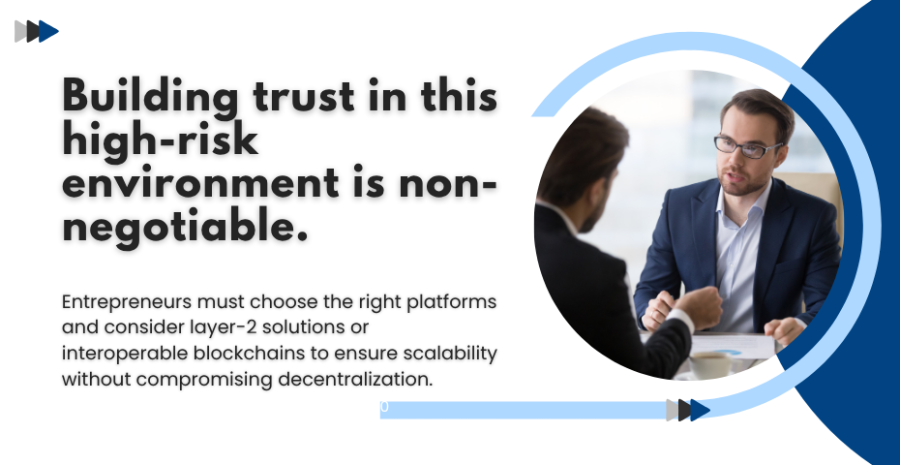
The Future with Crypto and Ecosystems for Entrepreneurs: Opportunities, Challenges, and the Road Ahead
.png)
The entrepreneurial landscape is undergoing a seismic shift, and at the heart of this transformation is the rise of cryptocurrencies and blockchain ecosystems.
As traditional systems strain under the weight of inefficiencies and centralization, decentralized technologies are opening up unprecedented opportunities for forward-thinking entrepreneurs.
The future of business is no longer confined by borders or legacy financial institutions—it is global, transparent, and powered by code.
Entrepreneurs today stand at the cusp of a digital revolution where innovation is not just an advantage, but a necessity.
In this new paradigm, blockchain enables more than just financial transactions—it fosters entire ecosystems where trust is built into the system architecture and autonomy is the default setting. Cryptocurrencies offer more than an alternative to fiat—they provide a gateway to new models of funding, community-building, and operations.
But with these exciting opportunities come significant challenges. Regulatory uncertainty, technical complexity, and rising competition demand resilience, agility, and ethical leadership from those who dare to lead in this space.
This blog explores the key opportunities, challenges, and support ecosystems shaping the future for crypto-savvy entrepreneurs, offering a roadmap to thrive in the decentralized economy of tomorrow.

Decentralized Finance, or DeFi, has dramatically expanded the possibilities for entrepreneurs seeking funding.
Traditional financing—often bound by rigid gatekeepers and complex procedures—is being disrupted by mechanisms like Initial Coin Offerings (ICOs), token sales, and Security Token Offerings (STOs).
These tools allow startups to raise capital directly from global communities without needing to go through banks or venture capital firms. DeFi also enables peer-to-peer lending and liquidity pools, giving entrepreneurs flexible and efficient funding options, while democratizing investment opportunities for backers.
Blockchain’s inherent qualities—transparency, immutability, and decentralization—are enabling entirely new types of businesses to emerge.
Entrepreneurs can now build models around verifiable supply chains, fractional ownership, digital identity management, and tokenized assets. Smart contracts automate complex agreements without intermediaries, reducing friction and enhancing trust.
This opens doors to efficiency-driven, customer-centric models that are leaner, faster, and more accountable than their traditional counterparts.
Crypto ecosystems break down borders, enabling entrepreneurs to scale their vision on a global level from day one.
Blockchain-based platforms support the formation of decentralized communities, where users, investors, and contributors are stakeholders in the network’s success.
These communities are often built through token-based incentives, social media platforms, and decentralized governance systems like DAOs (Decentralized Autonomous Organizations).
The result is a powerful, engaged user base that drives organic growth and innovation.
From supply chain logistics to digital identity, blockchain technology is enhancing operational efficiency across industries.
By reducing fraud, eliminating redundant processes, and enabling real-time data verification, businesses can cut costs and improve reliability.
For entrepreneurs, this means better margins, streamlined processes, and a level of security previously unattainable through legacy systems.
In industries plagued by trust issues, such as finance and logistics, blockchain is proving to be a game-changer.
In a world increasingly concerned with sustainability, blockchain is enabling transparency and accountability across entire ecosystems.
Entrepreneurs can leverage blockchain to track carbon footprints, verify ethical sourcing, and optimize resource usage.
This not only appeals to socially conscious consumers but also aligns with global sustainability goals.
Blockchain’s potential for impact entrepreneurship—where profit meets purpose—is one of its most promising applications.

The legal landscape surrounding crypto and blockchain remains in flux. Regulatory frameworks differ drastically across jurisdictions and are constantly evolving, making it difficult for entrepreneurs to plan with certainty.
Compliance requirements for token issuance, data protection, and consumer rights can vary, creating legal landmines for the uninformed.
Navigating this terrain requires up-to-date legal counsel and a proactive approach to risk management.
As crypto and blockchain go mainstream, large enterprises and tech giants are entering the space with deep pockets and vast resources.
Startups must innovate rapidly and focus on niche markets or underserved needs to compete effectively.
Being agile and responsive to community needs gives smaller players an edge, but standing out requires strategic branding, constant innovation, and unique value propositions.
Blockchain may be secure by design, but it is not immune to exploitation. From exchange hacks to smart contract bugs, the crypto world has seen its share of vulnerabilities.
Entrepreneurs must prioritize robust cybersecurity protocols, smart contract audits, and secure key management to protect their assets and customers.
Building trust in this high-risk environment is non-negotiable.

Some blockchain networks, especially earlier generations, face significant scalability issues.
Slow transaction times, high fees, and limited throughput can hinder user experience and growth.
Entrepreneurs must choose the right platforms and consider layer-2 solutions or interoperable blockchains to ensure scalability without compromising decentralization.
Understanding and implementing blockchain solutions require specialized knowledge that many entrepreneurs may not initially possess.
From cryptographic principles to decentralized governance models, the learning curve can be steep.
Access to technical expertise, whether through partnerships or team-building, is essential to avoid costly mistakes and accelerate development.

1. Incubators and Accelerators
A growing number of incubators and accelerators now specialize in blockchain and crypto startups.
These programs provide crucial support—including mentorship, funding, legal advice, and technical resources—helping early-stage projects scale quickly and sustainably.
Notable examples include ConsenSys Labs, Binance Labs, and Outlier Ventures.
Beyond traditional VCs, new crypto-native funding sources like DAOs, NFT-based crowdfunding, and DeFi lending protocols are becoming available.
Entrepreneurs can pitch their ideas to a global audience and secure backing from diverse and decentralized investor communities who believe in the mission.
The crypto space is rich with forums, Telegram groups, Discord channels, and Twitter spaces dedicated to entrepreneurship, blockchain development, and tokenomics.
Engaging in these communities helps entrepreneurs stay informed, build relationships, and receive feedback from fellow builders and users.
Education is a cornerstone of success in this fast-evolving space. Platforms like Coursera, Udemy, and CryptoZombies offer comprehensive blockchain and crypto courses.
Conferences, hackathons, and webinars provide opportunities to learn, network, and stay on top of trends.

Ethereum: The go-to platform for building decentralized applications and smart contracts, fostering innovation across industries.
Stellar: Focused on global remittances and financial inclusion, Stellar empowers entrepreneurs to build accessible payment solutions.
Polkadot: Designed for interoperability, Polkadot allows entrepreneurs to create specialized blockchains while connecting to a broader ecosystem.
Markethive: Notably, we shine a spotlight on Hivecoin, the backbone of the Markethive platform — the world’s first blockchain-based Market Network merging social media, marketing automation, and entrepreneurial tools. Hivecoin will significantly transform Markethive's gamification strategy. Offering tangible rewards and incentives will encourage active participation and engagement on the platform. Users can earn Hivecoin through various activities, including content creation, social interactions, and referrals. This will enhance the user experience and drive the overall growth and development of the Markethive ecosystem.
The future of entrepreneurship is being rewritten in real-time by crypto and blockchain technologies. What was once speculative is now forming the backbone of new digital economies, decentralized governance, and globally connected ecosystems.
For entrepreneurs, this represents a rare inflection point—an era of boundless innovation, radical transparency, and immense potential for positive impact.
Yet, to succeed in this uncharted terrain, entrepreneurs must remain adaptable, continually educate themselves, and build ethically and sustainably. By embracing the tools and ecosystems at their disposal, they can not only ride the next wave of technological disruption but lead it.
The entrepreneurs who will thrive in the crypto-powered future are not just building companies—they're architecting entirely new economies.
Now is the time to get ahead of the curve, seize the moment, and shape the future.
Your time to thrive is now. One step at a time.
....................................................................................................................................................................................................
About: Andries vanTonder
Over 46 years selfemployed
He is a Serial Entrepreneur, an Enthusiastic supporter of Blockchain Technology and a Cryptocurrency Investor
Find me: Markethive Profile Page | My Twitter Account | My Instagram Acount | and my Facebook Profile.
